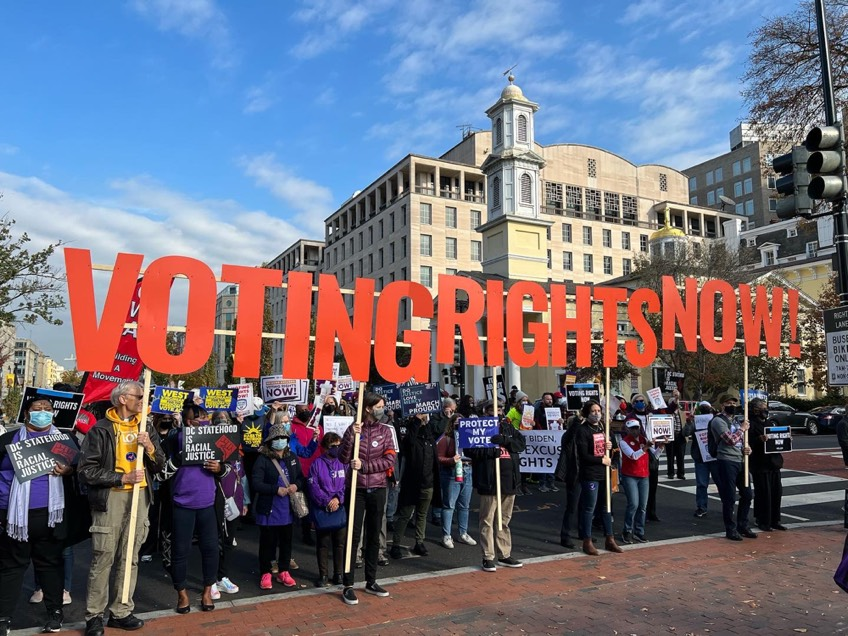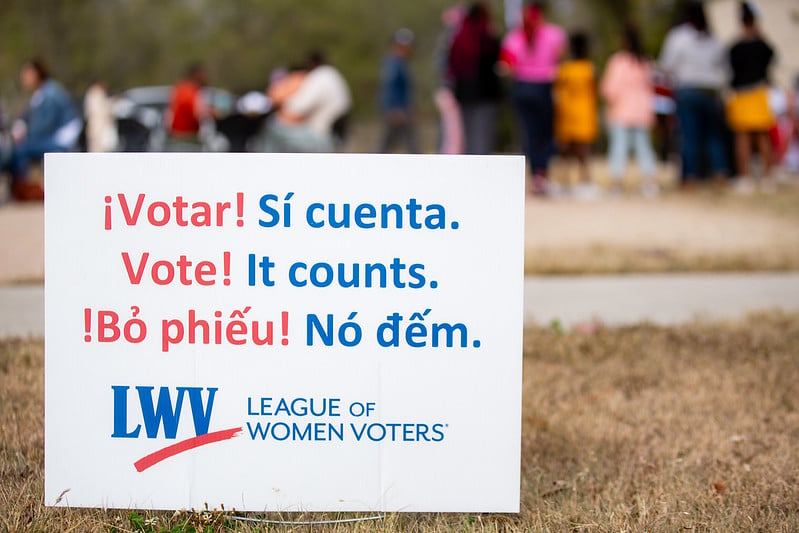This blog features contributions from Cecile Scoon and Debbie Chandler, co-presidents of the LWV of Florida.
In recent years, the state of Florida has implemented an alarming series of policies that undermine voter participation, creating conditions ripe for mass voter intimidation. State officials, led by Governor Ron DeSantis, have weaponized law enforcement to target voters across the state, from the arrest of formerly incarcerated individuals who believed they were eligible to vote to the harassment of citizens who signed petitions for a reproductive rights ballot initiative.
,
Stay Updated
Keep up with the League. Receive emails to your inbox!
,
These instances of systematic voter intimidation are a dangerous and deliberate attempt to disenfranchise certain communities — led explicitly by state institutions. They undermine both the rule of law and democratic norms. These actions create a chilling effect on political participation, discouraging people within the targeted communities from engaging in civic life. Fear and confusion around voter eligibility causes many to “remain de facto disenfranchised even when they are legally eligible to vote.”
The Attack on Florida’s Restoration of Rights
At the heart of this issue is the state's manipulation of Amendment 4, a 2018 constitutional amendment that was supposed to restore voting rights to many individuals with felony convictions. Passed with broad public support in 2018, as amendments to the Florida constitution are required to pass a 60% vote threshold, the amendment was seen as a significant step forward for democracy in Florida, particularly for lower-income and minority communities disproportionately affected by felony disenfranchisement.
However, subsequent state legislative and law enforcement actions have substantially limited the restoration of voting rights.
,

,
Although Floridians voted for the rights restoration amendment to re-enfranchise their fellow citizens, the legislature’s subsequent legislation, SB7066, effectively limited this intent by mandating that persons with felony convictions could not have their rights restored unless and until they paid off all legal financial obligations relating to the disenfranchising felony. This means any fines, fees, costs, or restitution “contained in the four corners the sentencing document” must be fully paid before a person can register to vote.
From 2013-2018, just 19% of fines and fees were paid back each year on average. This means the SB7066 requirement, in effect, likely bars approximately 80% of formerly incarcerated people from registering to vote.
In addition, since records of fines and fees were not intended to be used to prevent persons with felony convictions from voting, they were not maintained by governmental agencies in a comprehensive and searchable format. Therefore, the ability to determine if those monies were actually paid is severely hampered. As a result, it is almost impossible to determine whether monies are owed, to whom, and the amounts, making the requirement to pay fines and fees almost impossible to accomplish.
Voting rights groups, including the League of Women Voters of Florida, challenged SB7066 in federal court. After a trial, the court found it unconstitutional because the records were not systemically maintained. Unfortunately, the US Court of Appeals for the Eleventh Circuit overturned the district court’s decision in a 6-4 ruling.
,
,
Since then, some formerly incarcerated individuals who believed their voting rights were restored found themselves arrested, some at gunpoint, without prior warning. The arrests, conducted publicly just before an election, have sown mass confusion and fear, especially in Black and brown communities.
The chilling effect has been profound, as vulnerable populations now hesitate to exercise their right to vote, fearing that doing so could lead to criminal charges. Florida’s efforts to continue the disenfranchisement of voters over the will of a supermajority of its voters include passing new legislation to make prosecution of re-enfranchised voters easier for the state.
Florida’s Abortion Ballot: The Latest Battleground
In addition to targeting formerly incarcerated voters, Florida has also engaged in an unprecedented crackdown on a citizen-led petition initiative to restore abortion rights in 2024 (also named Amendment 4, “abortion rights amendment”). State police have visited individuals who signed the petition, subjecting them to intimidating interviews as an attempt to deter future voter participation and ultimately derail the amendment. The state claimed it was investigating potentially fraudulent petitions; however, state authorities had already certified the signatures on the ballots several months prior to the investigation.
,

,
The state also threatened legal action against TV stations airing ads in support of the abortion rights amendment, further escalating its campaign of voter suppression. The Federal Communications Commission (FCC) rebuked the state’s threats as violating the First Amendment right to free speech. Critics argued that these actions were part of a broader strategy to maintain political power by systematically disenfranchising marginalized groups. The state's actions were ultimately challenged in court, and a federal judge ruled that its actions were a bald assault on the First Amendment; the state was prohibited from threatening TV stations in this manner.
On November 5, 2024, 57% of Florida’s voters voted to approve the abortion rights amendment and protect reproductive freedom. Unfortunately, state law requires 60% of the vote to pass, so the amendment failed.
The Path Forward for Democracy in Florida
This pattern of state-directed voter intimidation marks a stark departure from our democratic principles. By deploying fear and confusion, Florida's government officials are actively working to suppress civic engagement and reduce turnout among those from the most alienated and disenfranchised demographics. These efforts, aimed at silencing the voices of low-income and minority voters, are a direct threat to the integrity of democracy.
,
,
The League of Women Voters of Florida (LWVFL) has developed a two-part Continuing Legal Education (CLE) course approved by the Florida Bar to train lawyers to assist returning citizens, aiming to remove financial obligations as a barrier to voting. The CLE courses teach lawyers to modify sentences by converting financial obligations into community service or having the obligations excused.
LWVFL collaborates with reentry programs and the Florida Rights Restoration Coalition (FRRC), requiring FRRC volunteer lawyers to complete the CLE training supporting the Fines and Fees and Sentence Modification programs. You can find further resources about Floridian voter restoration and registering disenfranchised voters here.
In 2024, the state League also drafted legislation to require the state to respond to requests for Advisory Opinions on whether a person with a felony can vote within 90 days. In August of the same year, the Florida Department of State released a proposed Advisory Opinion rule that would establish a 90-day deadline. This would be a vast improvement over the last three years, where there has been a two to three-year wait for responses with only around 20 completed each year. LWVFL will continue all efforts to make the Advisory Opinion process work in a fair and reasonable manner.
Floridians and national civil rights organizations are mobilizing to counter these tactics. The League supports reforms, such as the John Lewis Voting Rights Advancement Act (JLVRAA), that will safeguard the right to vote and ensure that state governments cannot use their power to undermine democratic participation. On the state level, the LWVFL will support the enactment of the Florida Voting Rights Act, which is largely patterned after the JLVRAA.
As Florida's actions show, the fight for voting rights is far from over. Without concerted efforts to protect historically disenfranchised communities, the future of free and fair elections remains at risk. What's occurring in Florida is a template for voter intimidation — and our efforts show some of the ways we can combat it.